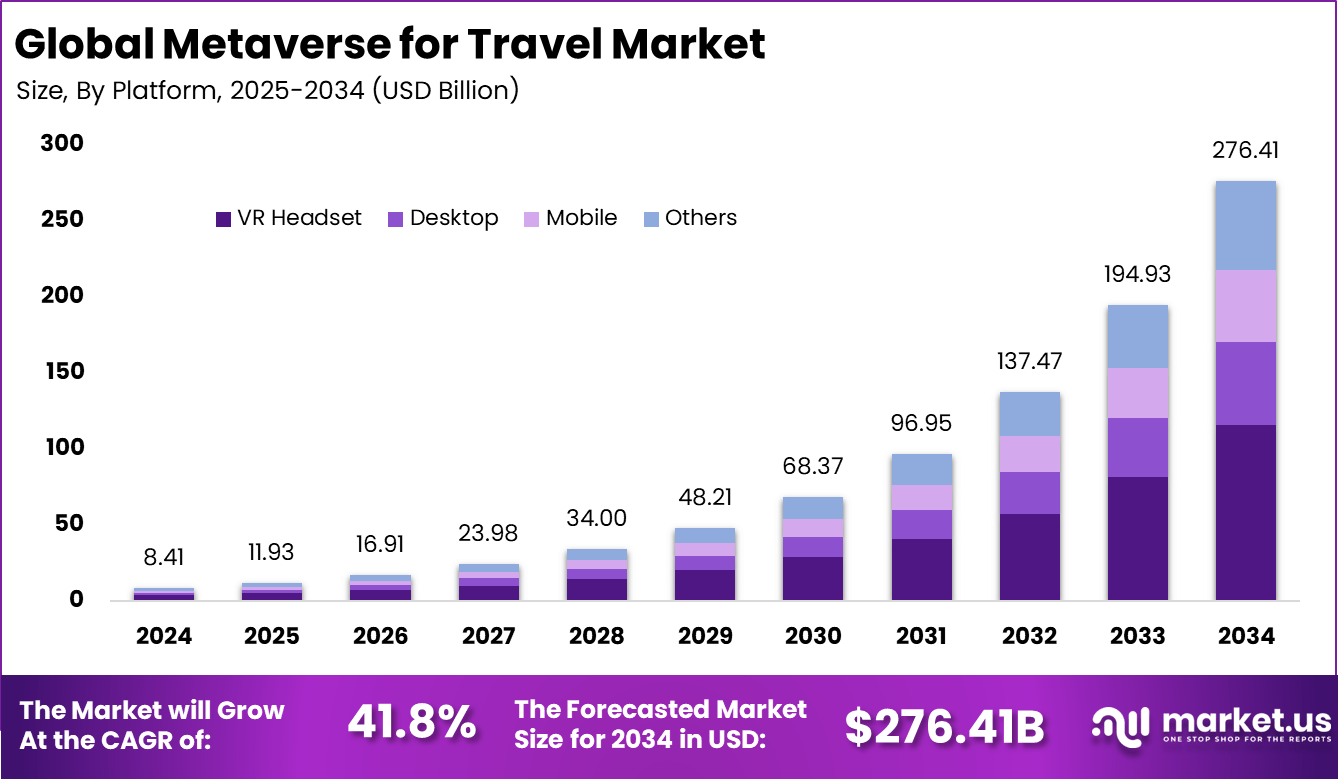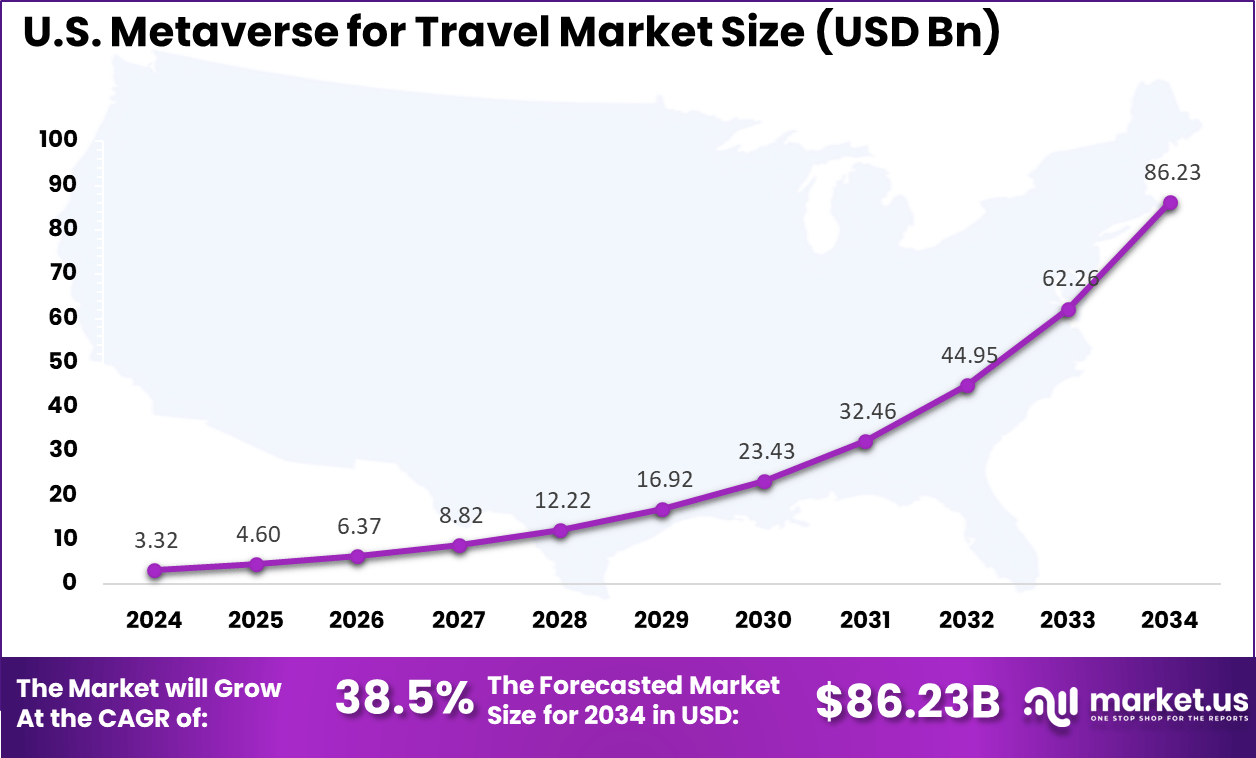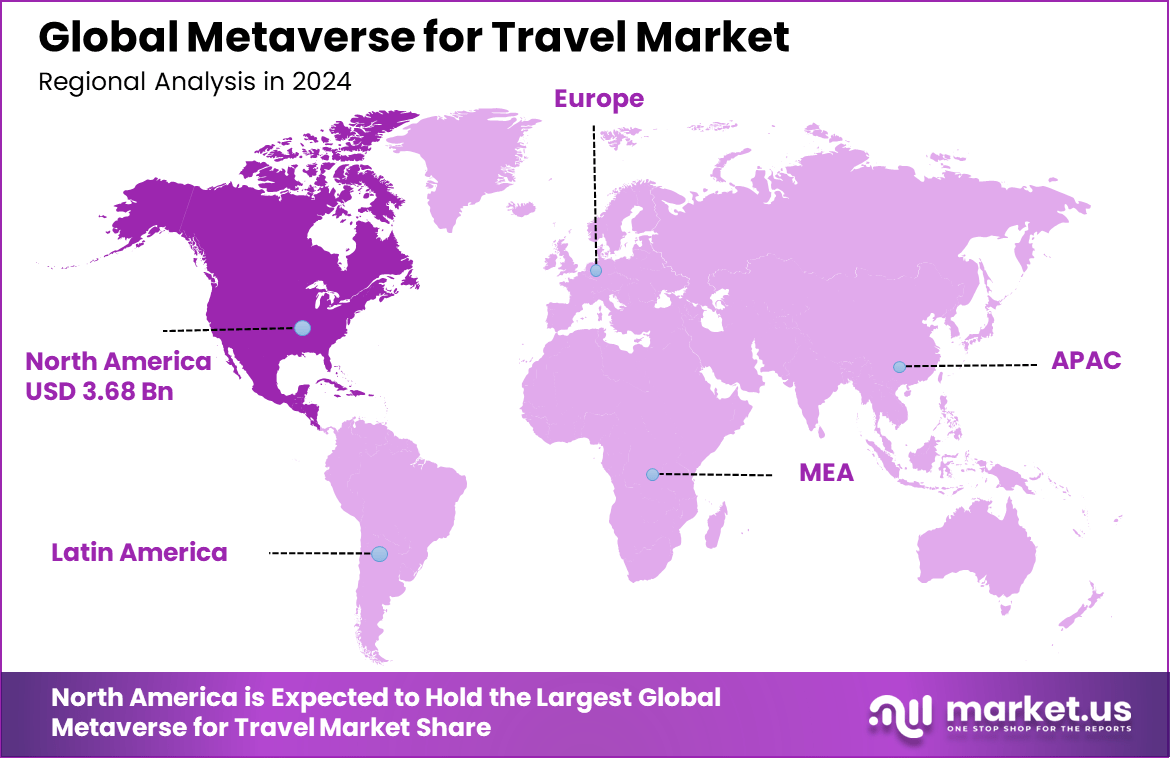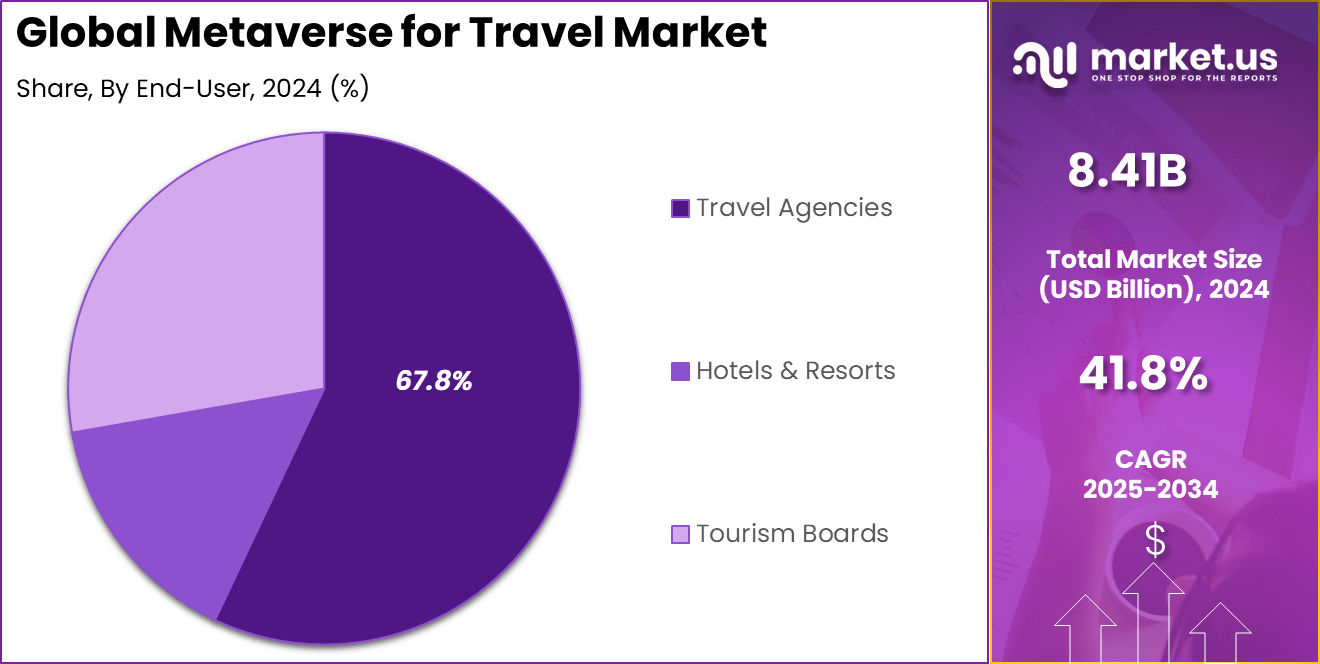Global Metaverse for Travel Market Size, Share, Industry Analysis Report By Platform (Desktop, Mobile, VR Headset, Others), By Technology (Virtual Reality, Augmented Reality, Mixed Reality, Blockchain, Others), By Application (Virtual Tours, Hotel Bookings, Destination Marketing, Travel Planning, Others), By End-User (Travel Agencies, Hotels & Resorts, Tourism Boards), By Regional Analysis, Global Trends and Opportunity, Future Outlook By 2025-2034
- Published date: Nov. 2025
- Report ID: 167769
- Number of Pages: 390
- Format:
-
keyboard_arrow_up
Quick Navigation
- Report Overview
- Key Takeaway
- Adoption and Usage Statistics
- Role of Generative AI
- U.S. Market Size
- Platform Analysis
- Technology Analysis
- Application Analysis
- End-User Analysis
- Investment and Business Benefits
- Emerging trends
- Growth Factors
- Key Market Segments
- Drivers
- Restraint
- Opportunities
- Challenges
- Key Players Analysis
- Recent Developments
- Report Scope
Report Overview
The Global Metaverse for Travel Market size is expected to be worth around USD 276.41 billion by 2034, from USD 8.41 billion in 2024, growing at a CAGR of 41.8% during the forecast period from 2025 to 2034. In 2024, North America held a dominant market position, capturing more than a 43.8% share, holding USD 3.68 billion in revenue.
The metaverse for travel market has expanded as travellers, tourism boards and service providers adopt immersive digital environments to showcase destinations and experiences. Growth reflects rising interest in virtual exploration, improved visualisation tools and broader acceptance of mixed reality as part of the travel decision process. The market now includes virtual tours, digital attractions, interactive travel planning experiences and simulated cultural environments.

Top Driving Factors for the Metaverse in Travel include the rising demand for VR and AR technologies, which grew by about 68% in headset shipments in recent years, enabling more immersive experiences. The convenience of virtually visiting locations regardless of physical limits or travel costs also pushes adoption. Increasing digital spending for travel-related technologies, which has seen around a 12% year-over-year increase, fuels development.
The market for the metaverse in travel is driven by the increasing demand for immersive and personalized virtual experiences. Travelers want to explore destinations, hotels, and attractions through augmented and virtual reality before making travel decisions. This technology allows users to interact with realistic digital environments, enhancing engagement and satisfaction.
For instance, in October 2024, Booking Holdings introduced new AI-powered features like Smart Filter, Property Q&A, and Review Summaries on its platform to simplify trip planning. These generative AI enhancements help travelers find accommodations and plan trips with confidence, pointing toward a future of AI-managed travel experiences that address disruptions like flight cancellations proactively.
Key Takeaway
- In 2024, the VR Headset segment led with a 41.8% share, reflecting strong adoption of immersive hardware to simulate travel experiences.
- The Virtual Reality segment dominated with 42.6%, showcasing VR’s central role in enabling interactive and immersive travel engagement.
- The Virtual Tours segment accounted for 48.3%, driven by rising consumer interest in exploring destinations digitally before making travel decisions.
- The Travel Agencies segment held a commanding 67.8% share, as agencies increasingly adopt metaverse tools for destination previews, customer engagement, and enhanced trip planning.
- The US market reached USD 3.32 billion in 2024 and is expanding at a strong CAGR of 38.5%, supported by technology innovation and rising demand for immersive travel solutions.
- North America led globally with over 43.8% share, backed by advanced VR adoption, strong digital infrastructure, and active investment in metaverse-based travel experiences.
Adoption and Usage Statistics
- Global user penetration for the metaverse is projected at 17.4% in 2025, rising sharply to 39.7% by 2030.
- Total global metaverse users are expected to reach 2.6 billion by 2030.
- North America remains one of the leading regions for early adoption and market share.
- In India, metaverse user penetration is projected at 12.4% in 2025, reflecting strong but emerging adoption.
- AR and VR adoption is expanding, with 44.8% AR/VR user penetration expected in India in 2025.
Role of Generative AI
Generative AI is becoming a game-changer in travel experiences within the metaverse, allowing for deeply personalized travel planning and interactive virtual tours. By analyzing a traveler’s preferences and past choices, generative AI can create custom itineraries that feel tailored just for them, making the whole process smoother and more enjoyable.
Studies show this kind of AI-driven personalization increases customer engagement by about 35%. It also helps travel companies present more realistic virtual previews of destinations, encouraging more confident booking decisions.
This technology keeps improving as it learns from user feedback and trends, ensuring recommendations stay fresh and relevant. The popularity of generative AI in travel platforms has been growing steadily, with a reported 40% increase in adoption rates. Users can tweak their preferences and get instant updates, making travel planning in the metaverse more flexible and user-friendly.
U.S. Market Size
The market for Metaverse for Travel within the U.S. is growing tremendously and is currently valued at USD 3.32 billion, the market has a projected CAGR of 38.5%. This growth is driven by increasing consumer demand for immersive and interactive travel experiences powered by virtual reality and augmented reality technologies.
Technological advancements, broader internet access, and the rise of 5G networks enable seamless, high-quality virtual travel that appeals to a tech-savvy population. Additionally, the increasing adoption of metaverse platforms by travel agencies, tour operators, and hospitality businesses further fuels the market expansion.
Consumers seek personalized and engaging ways to explore destinations virtually before booking, while travel companies invest in these technologies to enhance service delivery and capture new revenue streams. These factors collectively propel strong growth in the U.S. metaverse travel market.
For instance, in September 2025, Meta emphasized advancements in AI, mixed reality (MR), and augmented reality (AR) as key drivers of its metaverse evolution focused on travel experiences. Its upcoming AI-powered glasses aim to blend true AR with immersive 3D content to redefine how users explore travel destinations virtually.

In 2024, North America held a dominant market position in the Global Metaverse for Travel Market, capturing more than a 43.8% share, holding USD 3.68 billion in revenue. This leadership is driven by the region’s advanced technology infrastructure, notably in virtual and augmented reality, which facilitates immersive travel experiences.
Significant investments by major tech players have accelerated innovation and adoption of metaverse platforms within travel, enhancing user engagement and personalization options. Additionally, North America’s strong digital connectivity, high consumer acceptance of new technologies, and collaborations between travel and tech companies contribute to this dominance.
For instance, in May 2025, Airbnb launched its 2025 Summer Release, featuring reimagined apps and Airbnb Experiences that enable travelers to partake in virtual tours, local cultural activities, and immersive experiences hosted by locals, enhancing travel discovery and planning.

Platform Analysis
In 2024, The VR Headset segment held a dominant market position, capturing a 41.8% share of the Global Metaverse for Travel Market. This indicates that a large portion of users prefer immersive headset devices for exploring virtual travel experiences.
VR headsets deliver highly engaging environments, allowing travelers to feel physically present in digital recreations of destinations, which is a key reason for their popularity in this segment. Travel companies are increasingly adopting these devices to offer interactive and realistic experiences without the need for physical travel.
This growing adoption is attributed to advancements in VR hardware that improve comfort, visual quality, and user interaction. As VR technology develops further, it is expected to remain central in enhancing the way people plan, preview, and experience travel virtually. The appeal of fully immersive experiences keeps VR headsets at the forefront of metaverse travel solutions.
For Instance, in November 2025, Meta launched multiplayer Hyperscape VR rooms supporting up to eight concurrent users via Quest 3 headsets. This development enhances social VR experiences and encourages group travel exploration in immersive digital spaces, strengthening VR headsets’ role in metaverse travel. Meta also announced upgrades to its Horizon Engine, boosting virtual world size and graphical quality, improving overall VR headset user engagement.
Technology Analysis
In 2024, the Virtual Reality segment held a dominant market position, capturing a 42.6% share of the Global Metaverse for Travel Market. This reflects the dominant role of VR in creating immersive environments within the metaverse for travel. VR technology enables users to deeply engage with virtual destinations, providing them with realistic visual and spatial experiences.
It captures more attention than other metaverse-related technologies in this space by allowing users to explore places virtually from their homes. The widespread use of VR can be linked to its proven ability to simulate real-world environments convincingly.
This technology is favored for virtual tours, destination previews, and travel planning applications where immersion and interaction matter most. Innovations in VR systems continue to improve these virtual explorations in terms of quality and accessibility.
For instance, in May 2025, Unity announced enhanced VR development tools allowing creators to build more lifelike 3D travel experiences. The platform’s focus on realistic rendering and VR interactivity makes it a major technological contributor to virtual reality travel solutions in the metaverse.
Application Analysis
In 2024, The Virtual Tours segment held a dominant market position, capturing a 48.3% share of the Global Metaverse for Travel Market. This dominance is due to the increasing use of virtual tours to let travelers explore destinations remotely, reducing the uncertainty before booking a trip. Virtual tours offer more than just static videos by allowing interactive, immersive walkthroughs with narration, visuals, and educational content.
Tourism businesses are leveraging virtual tours as a marketing and engagement tool to provide potential travelers with a clear and realistic experience of destinations, hotels, and attractions. This helps consumers make more confident travel decisions and can also improve customer satisfaction and booking conversion rates. Virtual tours are becoming a standard feature in online travel services.
For Instance, in May 2025, Airbnb redesigned its app with expanded Experiences offerings, including virtual tours hosted by locals in 650 cities. This update supports immersive virtual tours that let users explore destinations interactively and authentically before booking trips, aligning with virtual tours’ leading role in the metaverse travel market.
End-User Analysis
In 2024, The Travel Agencies segment held a dominant market position, capturing a 67.8% share of the Global Metaverse for Travel Market. This reflects widespread adoption of metaverse technologies by travel intermediaries seeking to enhance client engagement and offer more personalized services. Agencies use metaverse platforms to provide virtual trip consultations, immersive previews, and interactive itinerary planning.
This trend underscores travel agencies’ drive to differentiate their offerings and improve the customer experience by leveraging emerging technology. As immersive tools become more accessible and preferred by consumers, travel agencies are positioned to be key facilitators in the metaverse travel ecosystem. Their strong presence in this market segment demonstrates the growing integration of virtual experiences in traditional travel services.
For Instance, in May 2025, Booking Holdings revamped its travel agency platforms with AI-powered tools to better personalize travel planning services, integrating virtual environment previews and consultations. The move highlights travel agencies’ adoption of metaverse technology to enhance client interactions and service offerings.

Investment and Business Benefits
Investment Opportunities are abundant in metaverse platform development, virtual real estate, and digital asset creation within travel environments. Investors are turning to virtual real estate where digital lands and spaces can be bought, developed, and rented, offering returns similar to physical properties.
The introduction of monetizable virtual events and paid virtual tours also creates new revenue streams. Brands leverage virtual marketing and sponsorship in metaverse platforms to reach global audiences, expanding business reach in innovative ways. Business Benefits include expanded global reach by overcoming geographic barriers, enhanced marketing through immersive and shareable experiences, and improved customer engagement via interactive VR and AR features.
Travel companies gain new revenue channels by offering exclusive virtual content and reducing costs related to physical infrastructure and travel logistics. The metaverse also supports inclusivity by making travel experiences accessible to those who cannot travel physically, broadening customer bases.
Emerging trends
Virtual reality (VR) and augmented reality (AR) are at the forefront of metaverse travel experiences, creating immersive environments that allow users to explore new places from their living rooms. VR/AR adoption has surged by 50%, broadening access to these lifelike travel simulations.
Another key trend is the use of digital twins, which are exact virtual replicas of real-world destinations. This allows travelers to preview trips in detail, helping them plan better and choose more confidently. Blockchain technology is also becoming more common in metaverse travel, adding layers of security and transparency for virtual travel shopping and transactions.
Growth Factors
One major growth factor is the rising consumer demand for unique, personalized travel experiences that traditional methods struggle to deliver. Metaverse travel platforms responding to this demand are seeing 30% faster user growth compared to conventional travel services.
Additionally, advances in VR/AR technology are lowering hardware costs and improving user interfaces, which expands the market by making immersive experiences more affordable and user-friendly. Another factor propelling growth is the increased digital engagement of younger demographics who prefer virtual interactions and digital exploration.
The expanding mobile adoption, with a 35% rise in metaverse travel app users, also supports this growth by making metaverse travel convenient and on-the-go. These factors combined drive broader acceptance and use of metaverse platforms for travel and tourism.
Key Market Segments
By Platform
- Desktop
- Mobile
- VR Headset
- Others
By Technology
- Virtual Reality
- Augmented Reality
- Mixed Reality
- Blockchain
- Others
By Application
- Virtual Tours
- Hotel Bookings
- Destination Marketing
- Travel Planning
- Others
By End-User
- Travel Agencies
- Hotels & Resorts
- Tourism Boards
Regional Analysis and Coverage
- North America
- US
- Canada
- Europe
- Germany
- France
- The UK
- Spain
- Italy
- Russia
- Netherlands
- Rest of Europe
- Asia Pacific
- China
- Japan
- South Korea
- India
- Australia
- Singapore
- Thailand
- Vietnam
- Rest of Latin America
- Latin America
- Brazil
- Mexico
- Rest of Latin America
- Middle East & Africa
- South Africa
- Saudi Arabia
- UAE
- Rest of MEA
Drivers
Growing demand for immersive travel experiences
The travel market is driven by a strong demand for immersive and personalized travel experiences enabled by augmented reality (AR) and virtual reality (VR) technologies. These technologies allow travelers to virtually explore destinations, hotels, and attractions before traveling, which enhances their overall experience and helps in making informed decisions.
With these immersive options, users can interact with digital environments that closely replicate real-world destina tions, thus fueling interest and engagement in virtual travel experiences. This driver creates new revenue streams as travel companies use metaverse platforms to offer personalized tours, enabling consumers to customize itineraries tailored to their interests.
For instance, in April 2025, Meta is advancing immersive travel experiences through its metaverse platform by enhancing public virtual spaces like Horizon Central. These upgrades improve travel-related virtual activities with faster load times and more interactive environments. Meta’s use of augmented reality (AR) and virtual reality (VR) tools provides travelers with vibrant, engaging virtual travel experiences that attract new users and expand bookings.
Restraint
High development and technology costs
Despite its potential, the metaverse travel market faces restraints due to the high costs involved in developing AR and VR applications and maintaining advanced infrastructure. These expenses create significant barriers for smaller players and startups, limiting market participation to companies with substantial investment capacity.
This high cost factor affects the scalability of metaverse travel solutions and slows widespread uptake. Furthermore, continuous improvement and maintenance of immersive environments require ongoing investment, making it challenging to sustain long-term growth without cost-effective development methods or wider hardware accessibility.
For instance, in May 2025, Airbnb’s 2025 Summer Release reveals challenges related to technology costs and infrastructure needs. While Airbnb enhances its app for seamless booking and immersive experiences, the cost and complexity of developing and maintaining such advanced platforms remain high. This limits smaller travel providers from fully adopting metaverse technology and affects widespread consumer hardware availability.
Opportunities
Expanding market to new customer segments
The metaverse opens travel opportunities to audiences who cannot travel physically, such as people with disabilities, financial limitations, or health restrictions. Virtual travel offers inclusive access to destinations, allowing a broader base of users to engage with travel experiences from their homes. This inclusivity broadens the customer base for travel providers and lets them monetize new segments previously unreachable through conventional travel offerings.
Moreover, virtual platforms allow travel agencies and hotels to showcase locations with virtual tours and interactive content, increasing customer engagement and boosting marketing effectiveness. This opportunity positions metaverse travel as a complement to physical travel, expanding overall industry reach and generating additional revenue streams by leveraging immersive digital experiences.
For instance, In November 2025, Google expanded its AI travel tools globally, adding Canvas planning and conversational booking across more than 200 countries. This update made travel planning more accessible and personalized for a wider range of users, including those unable to travel physically. The use of AI and virtual interfaces supported more inclusive travel experiences and broadened customer reach.
Challenges
Cybersecurity and regulatory concerns
The expansion of the metaverse in travel comes with significant challenges around data privacy, cybersecurity, and regulatory compliance. Virtual travel platforms collect large volumes of personal data to deliver customized experiences, making them targets for cyber threats. Ensuring secure handling of user information and protecting against cyberattacks requires robust security frameworks, which are still evolving in this space.
Additionally, the lack of standardized regulations governing metaverse operations and cross-border data flows creates legal uncertainty, complicating market growth. Companies must navigate complex rules while addressing user trust and safety concerns. Balancing innovation with compliance will be critical to overcoming these challenges and building sustainable metaverse ecosystems in travel.
For instance, In August 2025, Expedia Group introduced new AI-powered B2B travel APIs and generative AI features to support partner growth and improve traveler engagement. At the same time, the rapid use of AI and metaverse tools increased complexity around data privacy and cybersecurity. These developments highlighted the ongoing challenge of protecting user information and meeting regulatory requirements as digital travel experiences become more personalized and integrated.
Key Players Analysis
Meta, Google, and Microsoft lead the metaverse for travel market with advanced XR, AI, and cloud platforms that enable immersive virtual tourism. Their technologies support interactive travel experiences, digital twins of destinations, and real-time virtual exploration. These companies focus on improving realism, user engagement, and seamless integration with mobile and VR devices.
Airbnb, Booking Holdings, Expedia Group, Accenture, and NVIDIA strengthen the market by combining metaverse environments with hospitality, travel booking, and enterprise-grade visualization tools. Their platforms enable virtual hotel tours, interactive property walkthroughs, and enhanced travel planning experiences. These providers support tourism boards, hotels, and travel agencies with scalable 3D environments and AI-driven personalization.
Unity, Roblox, Decentraland, The Sandbox, Somnium Space, VIVE, Tripadvisor, and other participants expand the landscape with immersive worlds, user-generated content, and social travel experiences. Their platforms allow travelers to explore destinations, attend virtual cultural events, and interact with communities before booking physical trips. These companies prioritize accessibility, creative tools, and social engagement.
Top Key Players in the Market
- Meta
- Microsoft
- Airbnb
- Booking Holdings
- Expedia Group
- Accenture
- NVIDIA
- Unity
- Roblox
- Decentraland
- The Sandbox
- Somnium Space
- VIVE
- Tripadvisor
- Others
Recent Developments
- In September 2025, Meta Platforms unveiled its AI-powered smart glasses with augmented reality (AR) features, aiming to deepen immersive metaverse travel experiences. This includes the anticipated Meta Celeste glasses with advanced AR waveguide displays and AI assistants, enhancing mixed reality (MR) interactions for travel and tourism applications.
- In August 2025, Expedia Group expanded its B2B travel platform with new generative AI-powered features, including improved search and discovery tools through integrations with OpenAI’s Operator and Microsoft Copilot Actions. The move enhances traveler engagement and supports dynamic, personalized travel inspiration and booking experiences within the metaverse ecosystem.
Report Scope
Report Features Description Market Value (2024) USD 8.41 Bn Forecast Revenue (2034) USD 276.4 Bn CAGR(2025-2034) 41.8% Base Year for Estimation 2024 Historic Period 2020-2023 Forecast Period 2025-2034 Report Coverage Revenue forecast, AI impact on Market trends, Share Insights, Company ranking, competitive landscape, Recent Developments, Market Dynamics and Emerging Trends Segments Covered By Platform (Desktop, Mobile, VR Headset, Others), By Technology (Virtual Reality, Augmented Reality, Mixed Reality, Blockchain, Others), By Application (Virtual Tours, Hotel Bookings, Destination Marketing, Travel Planning, Others), By End-User (Travel Agencies, Hotels & Resorts, Tourism Boards) Regional Analysis North America – US, Canada; Europe – Germany, France, The UK, Spain, Italy, Russia, Netherlands, Rest of Europe; Asia Pacific – China, Japan, South Korea, India, New Zealand, Singapore, Thailand, Vietnam, Rest of Latin America; Latin America – Brazil, Mexico, Rest of Latin America; Middle East & Africa – South Africa, Saudi Arabia, UAE, Rest of MEA Competitive Landscape Meta, Google, Microsoft, Airbnb, Booking Holdings, Expedia Group, Accenture, NVIDIA, Unity, Roblox, Decentraland, The Sandbox, Somnium Space, VIVE, Tripadvisor, Others Customization Scope Customization for segments, region/country-level will be provided. Moreover, additional customization can be done based on the requirements. Purchase Options We have three license to opt for: Single User License, Multi-User License (Up to 5 Users), Corporate Use License (Unlimited User and Printable PDF)  Metaverse for Travel MarketPublished date: Nov. 2025add_shopping_cartBuy Now get_appDownload Sample
Metaverse for Travel MarketPublished date: Nov. 2025add_shopping_cartBuy Now get_appDownload Sample -
-
- Meta
- Microsoft
- Airbnb
- Booking Holdings
- Expedia Group
- Accenture
- NVIDIA
- Unity
- Roblox
- Decentraland
- The Sandbox
- Somnium Space
- VIVE
- Tripadvisor
- Others













